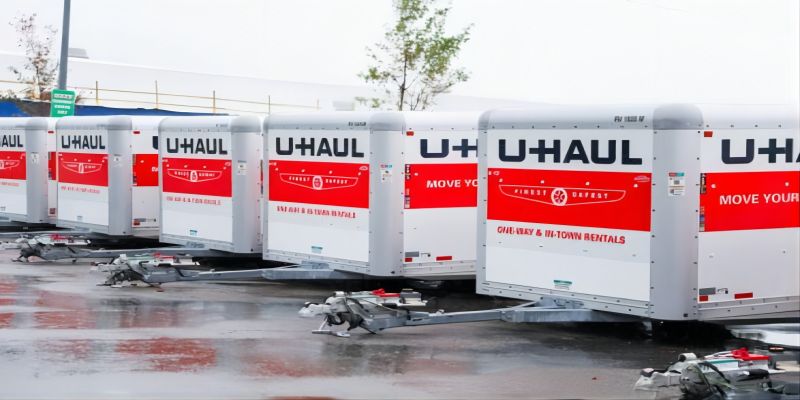When preparing for a move, one of the crucial decisions you'll face is whether or not to opt for rental truck insurance. This insurance, often offered by companies like U-Haul, aims to protect you from potential financial losses due to accidents or damage. But is it really necessary? This comprehensive guide is designed to help you navigate the nuances of U-Haul insurance, making you well-equipped to decide if this added protection fits your moving needs. We'll delve into the elements that determine the cost, the coverage it provides, and the circumstances under which it makes the most sense to invest in such insurance. Consider this your roadmap to understanding U-Haul insurance, so you can focus more on your move and less on the unforeseen.
Understanding U-Haul Insurance

Before we dive into the specifics of U-Haul insurance, it's essential to understand what rental truck insurance is and why it exists. When you rent a moving truck from a company like U-Haul, the vehicle comes with a limited amount of liability coverage. This means that if you are involved in an accident while driving the truck, any damages or injuries caused by your actions may be partially covered by the company's insurance. However, this coverage is often minimal and may not protect you entirely in case of a significant accident.
Different types of U-Haul insurance available
Depending on the company and your specific needs, there are various types of U-Haul insurance you can opt for. These include:
- Collision Damage Waiver (CDW): This type of insurance covers any damages caused to the rented truck in case of an accident. It's similar to standard car rental insurance and is often included in the rental price.
- Supplemental Liability Insurance (SLI): This insurance covers damages or injuries caused to a third party in case of an accident. It's recommended for those who want additional liability coverage beyond what is included in the rental price.
- Personal Accident and Cargo Protection (PACP): This insurance covers medical costs for injuries sustained by the driver, passengers, or household members during the move. It also provides coverage for any damages to personal belongings inside the truck.
- Safemove®: This is a bundle of all three types of insurance mentioned above, providing comprehensive protection in case of an accident or damage.
Factors that determine U-Haul insurance cost
The cost of U-Haul insurance can vary based on several factors, including:
- Your location: Insurance rates can differ depending on where you're renting the truck.
- The type of coverage chosen: The more insurance policies you opt for, the higher your overall cost will be.
- The distance of your move: If you're moving locally, the cost may be lower compared to a long-distance move.
- The value of your belongings: If you're transporting expensive items, it may be worth investing in additional insurance to protect them.
When does U-Haul insurance make sense?
Now, the big question: Is U-Haul insurance necessary for your move? Ultimately, the decision depends on your unique situation and preferences. Here are a few scenarios where opting for U-Haul insurance may make sense:
- You're making a long-distance move and want to ensure you have comprehensive coverage for any potential accidents or damages.
- You're transporting valuable items that may not be fully covered by the limited liability insurance included in your rental price.
- You don't have personal auto insurance that covers rental vehicles, leaving you vulnerable in case of an accident.
Assessing Your Current Insurance Policies
Before deciding whether or not to invest in U-Haul insurance, it's essential to review your current insurance policies. In some cases, you may already have coverage that extends to rental vehicles, making additional U-Haul insurance unnecessary.
- Personal auto insurance: If you have a personal auto insurance policy, it may cover rental vehicles as well. Check with your provider to see if this coverage extends to moving trucks.
- Homeowners/renters insurance: If you have homeowners or renters insurance, it may cover your belongings during a move. However, this coverage typically applies only when your belongings are in transit and not while they're being loaded or unloaded from the truck.
Things to look for in your existing policies
When reviewing your current insurance policies, be sure to look for the following:
- Deductibles: If you opt for U-Haul insurance, you may still have to pay a deductible in case of an accident. Check if this is already covered by your existing policies.
- Exclusions: Make sure to read through any exclusions listed in your current policies. These may include specific types of accidents or damages that are not covered.
- Coverage limits: Be aware of any maximum coverage limits in your existing policies. This will help you determine if additional U-Haul insurance is necessary to fully protect your belongings.
How to purchase U-Haul insurance?

If you've decided to opt for U-Haul insurance, the process is relatively straightforward. You can purchase it online when booking your truck or add it on later through your account or by calling customer service. Be sure to carefully review the coverage options and costs before making a decision.
Conclusion
U-Haul insurance can provide additional peace of mind during a move, but it's essential to understand the coverage options and costs before making a decision. Be sure to assess your current insurance policies and consider factors such as distance, value of belongings, and personal preferences before deciding if U-Haul insurance is right for you. With this knowledge in hand, you can confidently navigate the process of securing insurance for your rental truck and focus on a successful and stress-free move. So, it's always beneficial to explore all options available and make an informed decision based on your specific needs.

Land Investment: Understanding Benefits and Potential Risks

Options Basics: How To Pick The Right Strike Price In 2022

BMO Mortgage Review 2024

What is Interest Rate Risk: An Overview

Understanding and Filing Form 1065: U.S. Return of Partnership Income

Navigating the Need for U-Haul Insurance: A Comprehensive Guide

What Is a Roth IRA? Rules, Benefits, and Investing Methods

Exploring The Most Heavily Shorted Stocks In The Market: A Comprehensive Analysis

What is Active Income and How Does It Differ from Passive Income?

The Battle of The Risks: Should I Invest or Pay Off my Mortgage?

6 Investment Platforms to Consider Besides Personal Capital
